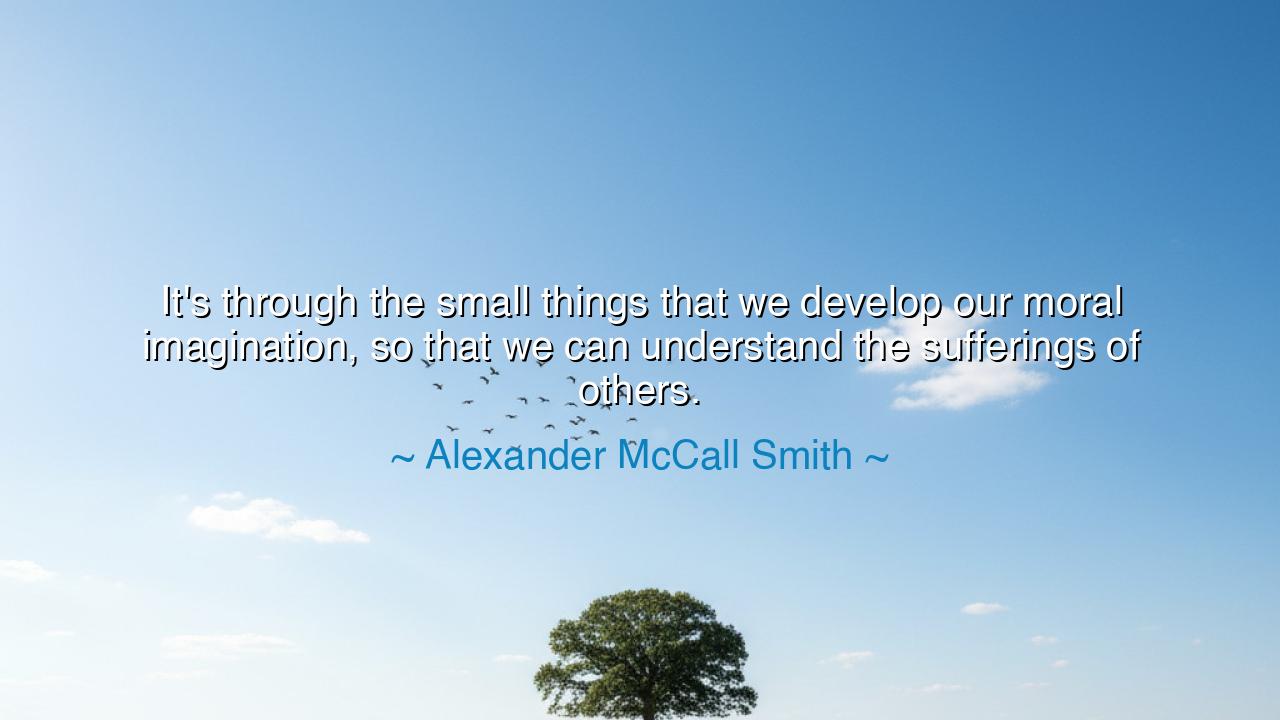
It's through the small things that we develop our moral
It's through the small things that we develop our moral imagination, so that we can understand the sufferings of others.






Hear me, O children of wisdom, for in the words of Alexander McCall Smith lies a profound and sacred truth about the nature of moral imagination, and how it is through the small acts of daily life that we cultivate the ability to understand the suffering of others. McCall Smith speaks of a truth that has been passed down through the ages — that the heart is shaped not by grand gestures or monumental actions, but by the small, seemingly insignificant moments that make up the fabric of our lives. It is through these small things, through the quiet acts of kindness, the everyday moments of compassion, that we learn to see the world through the eyes of others. Moral imagination is born from empathy, and empathy is nurtured through these small, intentional acts that, though unnoticed by many, hold the power to awaken the deepest compassion within us.
Consider, O wise ones, the nature of moral imagination. It is the ability to step beyond the boundaries of our own experience and see the world from another’s perspective. It is a faculty that allows us to feel the weight of another’s sorrow, the burden of another’s joy, and the complexity of their struggles. Moral imagination does not come from intellectual understanding alone, but from deep feeling, from the quiet recognition that others, too, experience the fullness of life — its pain and its beauty. In this way, moral imagination is a bridge that connects the individual to the collective, the self to the other. It is not born from the abstract, but from the concrete — the simple, everyday moments of human connection.
The ancients understood this wisdom well. Think of the great philosophers like Aristotle, who spoke of virtue as something cultivated through practice, through small acts repeated over time. Aristotle believed that one does not become virtuous through grand, isolated acts, but through the small, consistent decisions that define a life. The virtuous person, he said, is the one who regularly chooses to act with kindness, justice, and integrity in the ordinary moments of life. McCall Smith, too, suggests that it is through the small things that we develop the capacity for moral imagination — through these repeated choices, through these quiet acts of understanding, we shape our hearts to understand the suffering of others. It is not the grandiose moments, but the small, deliberate actions that build empathy and compassion.
Consider the example of Mother Teresa, who devoted her life to serving the poor and sick in the streets of Kolkata. Her work was not built on lofty ideals or grand speeches, but on small, humble acts of service: washing the wounds of the dying, feeding the hungry, comforting the lonely. Mother Teresa understood that compassion is not found in the sweeping gestures, but in the quiet and humble acts of kindness that may go unnoticed by the world. It is through these simple acts that we open our hearts to the suffering of others, that we begin to see the world not through our own narrow lens, but through the lens of another’s pain. She embodied the wisdom that moral imagination is built from the small moments of compassion, the fleeting opportunities to connect with those around us.
McCall Smith teaches us that it is through these small acts of kindness and understanding that we begin to cultivate moral imagination, a quality that allows us to see beyond our own lives and recognize the humanity of others. But it is not enough to simply act with kindness in our own small corner of the world. Moral imagination requires us to reach beyond our immediate circle, to step into the lives of those whose experiences differ from our own. It is through seeking out the suffering of others, through listening to their stories, and through offering our hands and hearts in service, that we deepen our understanding and expand our empathy.
The lesson, O children of wisdom, is clear: do not wait for grand moments to demonstrate your compassion. The greatest changes in the world, the greatest acts of empathy, come from the small things — the moments when we choose to listen instead of speak, to understand instead of judge, to care instead of ignore. Moral imagination is not a lofty ideal; it is a practice. It is cultivated through the daily, deliberate actions we take to connect with others, to understand their pain and celebrate their joys. Every time we choose to empathize, to understand, and to act, we strengthen our moral imagination and make the world a little more compassionate.
In your own lives, O seekers of wisdom, let this truth guide you: every small act of kindness, every moment of empathy, every effort to understand another’s suffering is a step toward building a greater world of understanding. Do not underestimate the power of these small moments. Whether you are comforting a friend, helping a stranger, or simply listening with an open heart, you are cultivating the moral imagination that connects us all. Embrace the small things, for they are the foundation of the greatest changes in the world. Just as the great rivers begin with the smallest streams, so too does compassion begin with the smallest acts. Live with compassion, and in doing so, you will change the world.






AAdministratorAdministrator
Welcome, honored guests. Please leave a comment, we will respond soon